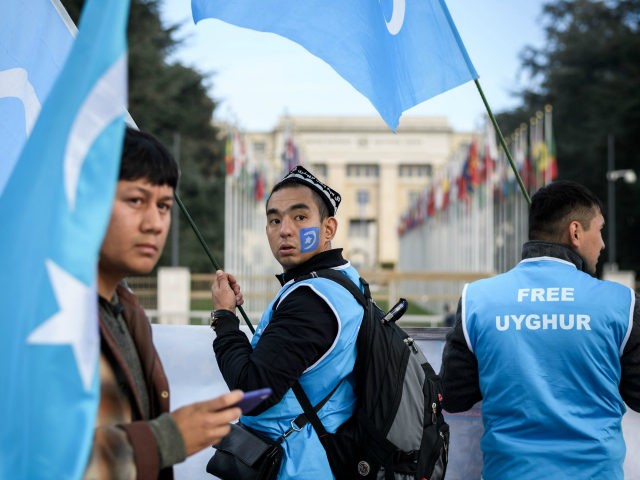China rejected calls on Tuesday from Western members of the U.N. Human Rights Council (UNHRC) to shut down the massive detention camps constructed in Xinjiang province to imprison a sizable percentage of Uighurs, a predominantly Muslim ethnic group.
The Chinese claimed that reports of the vast scale of detentions in Xinjiang are “seriously far away from facts,” even as a new study revealed security spending in the province more than tripled during the past year.
On Tuesday, Reuters relayed some of the criticism directed at China during a meeting of the UNHRC in Geneva:
“We are alarmed by the government of China’s worsening crackdown on Uighurs, Kazakhs, and other Muslims in the Xinjiang Uighur Autonomous Region,” U.S. charge d’affaires Mark Cassayre said.
The United States urged China to “abolish all forms of arbitrary detention, including internment camps in Xinjiang, and immediately release the hundreds of thousands, possibly millions, of individuals detained in these camps,” he said.
China should release activists including Wang Quanzhang, Ilham Tohti and Huang Qi, Cassayre said.
Beijing should “halt massive imprisonment” and “guarantee freedom of religion and belief, including in Tibet and Xinjiang,” French Ambassador Francois Rivasseau said.
Gay McDougall, a member of the U.N.’s Committee on the Elimination of Racial Discrimination, said Xinjiang province has become “something resembling a massive internment camp, shrouded in secrecy, a sort of no-rights zone.”
The U.S. and U.K. had some tough questions for China, as reported by Channel News Asia:
One question by the US – which is leading demands for Beijing to come clean on the crackdown – says: “Can China clarify the basis for its apparent criminalization of peaceful religious practices as justification to detain people in these political ‘re-education’ camps in Xinjiang, as well as which officials are responsible for this policy?”
Washington also wants Beijing to provide “the number of people involuntarily held in all detention facilities in Xinjiang during the past five years.”
Britain has asked when China will implement a UN racial discrimination panel’s recommendation that it “halt the practice of detaining individuals who have not been lawfully charged, tried, and convicted for a criminal offence in any extralegal detention facilities.”
Canada’s representative to the UNHRC, Tamara Mawhinney, denounced the “deterioration of human rights” in China and called on Beijing to “end prosecution and persecution on the basis of religion or belief.”
As Canada’s Globe and Mail noted while passing along Mawhinney’s words, China’s admirers, satellite states, clients, and fellow travelers in authoritarianism drowned out the criticism with “a chorus of flattery for Beijing”:
Bangladesh marveled at “the development miracle of China.” North Korea commended Beijing “for its strenuous efforts and brilliant success made for the promotion and protection of human rights.” South Africa called China ”a global leader on people-centered development and poverty eradication, as well as a formidable defender of multilateralism.”
“We particularly congratulate China on its economic and social achievements, which are extraordinary,” added a delegate from Burundi, who recommended “that China continue to focus on terrorist organizations” like the East Turkestan Islamic Movement.
China’s representatives to the UNHRC rejected all criticism out of hand, accused Western nations of downplaying “the remarkable achievements made by China,” and defended its suppression of free speech and political dissent in jurisdictions from Xinjiang to Hong Kong by arguing that “freedom is not absolute.”
“We will not accept the politically driven accusations from a few countries that are fraught with biases, with total disregard for facts. No country shall dictate the definition of democracy and human rights,” snarled Chinese Vice Foreign Minister Le Yucheng, effectively dismissing human rights concerns as a racket that jealous Western nations organized to keep Beijing in check.
Several member states urged China to allow U.N. observers into Xinjiang to inspect the camps. After initially denying their existence and downplaying their size, the Chinese began describing them as “vocational training centers” and “de-radicalization” clinics. China has, thus far, dismissed requests for U.N. monitors in the Uighur camps as a violation of its sovereignty.
A report that the Jamestown Foundation published on Monday analyzed Chinese government budgets and determined that security spending in Xinjiang increased by 213 percent. The authors said this money clearly was not spent on “vocational training,” as quoted by Reuters:
“Xinjiang’s budget figures do not reflect increased spending on vocational education … as the region ramped up camp construction; nor do they reflect an increase in criminal cases handled by courts and prosecutors,” said the report’s author, Adrian Zenz, an anthropologist at the European School of Culture and Theology in Germany.
“Rather, they reflect patterns of spending consistent with the construction and operation of highly secure political re-education camps designed to imprison hundreds of thousands of Uyghurs with minimal due process.”
It also found that despite the purported large “vocational training” campaign, employment outcomes had not markedly improved, according to Xinjiang’s own official employment figures.
Whatever training the facilities do provide, Zenz said, it appeared it was not administered or paid for by the vocational education system.
Asked about the Jamestown Foundation report on Tuesday, Chinese Foreign Ministry spokeswoman Hua Chunying professed ignorance of how much money her government spends in Xinjiang province and asked if the Jamestown research properly accounted for how much Beijing spends on “developing the economy and improving lives.”

COMMENTS
Please let us know if you're having issues with commenting.